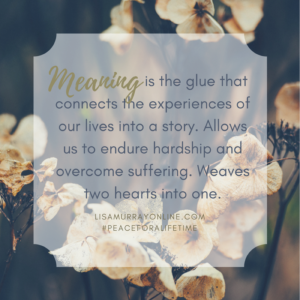Three Signs Your Marriage Could Be Emotionally Bankrupt
Three Signs Your Marriage Could Be Emotionally Bankrupt
Categories: RECENT RESEARCH

Lisa Murray, M.A.
 It was the perfect day for a wedding. Their eyes were filled with love and longing, their dreams diffused by tint of their rose-colored glasses.
It was the perfect day for a wedding. Their eyes were filled with love and longing, their dreams diffused by tint of their rose-colored glasses.
Those early years together tore through like a whirlwind. The first little house, the first bouncing baby, the first big job promotion—it was all exciting, almost intoxicating—as if they were writing the opening chapters of their fairytale love story.
They had dreamed about how they would build their lives together. The sacrifices we make today will pay off in the end, they told themselves. One day we will have the dream. One day we’ll be living the dream.
It was all too good to be true, really. Whether it was the jobs, the moves, the kids, or the in-laws, without a whisper or a knock, the distance began to steal into their relationship and pull them apart.
One day she recognized that they no longer looked at one another, no longer sat on the back porch with their fingers intertwined, unwinding together as the sun stole beneath the horizon. There were many no longer’s, she pondered.
Many couples start their marriage with a spark and a fire that feels like forever only to wake up one day to the reality that emotionally, they are barely existing on fumes. We would never expect a fire to burn without something to fan the flames, but when there’s nothing left of our love but a few cold embers, we’re left wondering how we ever got to this place and how can we begin to heal the distance to find our way back to one another? Here are three signs your marriage could be emotionally bankrupt.
The absence of feelings
We have believed the lie that feelings are bad, that showing or expressing feelings is a sign of unforgivable weakness. When we first started dating, sharing feelings was different. Things felt so safe, so real. We were curious about anything and everything that had to do with our mate. Expressing emotions was as natural as the slow inhale before we said, I love you. Yet if we’re honest, most of our feelings back then were positive, as they should have been. We were in the slow waltz of falling in love.
Over time, however, once the honeymoon passes and we come face to face with many of the startling and messy realities of human connection, the negative feelings begin to mount and we no longer feel as safe with our partner as we did during our courtship. In that moment, many couples slowly start to shut down, turn away, and avoid the each other’s gaze.
We hide behind superficial exchanges and pale routines, focusing instead on the children, the schedules, and the responsibilities. The only feelings that crowd our hearts are the feelings of anger and resentment, the feelings of pure pain and rejection that we can barely stifle as we sit silently eating dinner, coolly conversing about everything and nothing at all.
When was the last heart-to-heart conversation you had with your husband or wife that didn’t include anger, accusations, or criticism? Do your primary interactions with your spouse center around the schedules and tasks of the day? How can you begin to share your deepest feelings, fears, and self with your mate?
You can foster resilience in your relationship today by engaging your feelings, not shutting them down. Take a risk, lean in and share. Don’t expect anything in return. Whether we get back what we think we want or need, we create opportunities for courage to flourish and intimacy to grow, simply by sharing.
Therefore encourage one another and build up one another, just as you also are doing. – 1 Thessalonians 5:11
A lack of compassion
We all long for a safe place to land, a place where we can be seen and heard, a place where we can be accepted for who we are—our strengths and our weaknesses, a place where we can take risks, explore fresh curiosities. In a place that should be the safest place for us as individuals to heal and grow, our marriages often become battlefields where we are simply trying to avoid getting hit by the next round of fire.
We live in a world where compassion is scarce and criticism, control, and shame abound. Our relationships measure our imperfections, our failures and inadequacies. Because we are too afraid to own our individual shortcomings, we become masters at pointing out everyone else’s.
There is little room to risk when there is no compassion. Little desire to become vulnerable when so much of our safety is at stake. Little courage to engage when the sting of rejection looms so large in our hearts and our minds.
 We can foster compassion in our relationships by first learning how to be compassionate with ourselves. When we embrace our own belovedness, our worth, when we stop striving so hard for the unattainable and start giving ourselves a path towards acceptance, wholeness, and creativity, only then can we offer compassion to our spouses.
We can foster compassion in our relationships by first learning how to be compassionate with ourselves. When we embrace our own belovedness, our worth, when we stop striving so hard for the unattainable and start giving ourselves a path towards acceptance, wholeness, and creativity, only then can we offer compassion to our spouses.
Can you begin to offer yourself more compassion, more kindness as you move through your day? Can you begin to offer your spouse compassion as they walk on their journey? Can you cheer them, comfort them, or encourage them? Can you offer them the same kindness you would like to be shown, even if they fail to acknowledge it or even reciprocate it?
So, as those who have been chosen of God, holy and beloved, put on a heart of compassion, kindness, humility, gentleness and patience. – Colossians 3:12
The absence of meaning
In a recent article, psychologists Gary Reker and Phillip Wong, defined meaning as, The cognizance of order, coherence and purpose in one’s existence, the pursuit and attainment of worthwhile goals, and an accompanying sense of fulfillment. Meaning can help buffer against despair, withdrawl, and isolation. Existential psychiatrist Viktor Frankl believed the need for meaning was a crucial force in people, from the time they were born until their last breath.
Meaning is the glue that connects the experiences of our lives in a story. Our shared story creates intimacy and closeness in our relationships. Meaning allows us to endure hardship and overcome suffering. Meaning weaves two hearts into one.
 When couples shut down their feelings, when they shut down compassion, they also shut down the meaning that comes from the narrative they write about their lives and their relationship. They stifle any meaning that comes from dreaming about their futures, their children and grandchildren. As a result, any intimacy is squashed and as they drift further apart, there is little to hold them together, little to fuel the connection their relationship needs in order to thrive.
When couples shut down their feelings, when they shut down compassion, they also shut down the meaning that comes from the narrative they write about their lives and their relationship. They stifle any meaning that comes from dreaming about their futures, their children and grandchildren. As a result, any intimacy is squashed and as they drift further apart, there is little to hold them together, little to fuel the connection their relationship needs in order to thrive.
Brene Brown shares the importance of meaning in our relationships by stating, Connection is why we’re here; it is what gives purpose and meaning to our lives.
The life of Christ models for us a life built on meaning and connection. As Jesus walked with His disciples from city to city, preaching and performing miracles, at times encountering hardship and rejection, they created meaning for themselves on their journeys, and meaning for us today. How important it is in our relationships to dare to lean in, share our emotions, create our shared narrative, in a way that strengthens us for the journey ahead. Disconnection and distance destroys. Meaning magnifies. It strengthens our collective roots.
Can you begin to engage your spouse and share your struggles? Can you create a collective narrative based on your mutual beliefs and values that strengthens your connection? Can you dare to dream again?
Many individuals keep waiting for their partner to change before they will change, further continuing the cycle of heartbreak, distance, and despair. You don’t have to wait on anyone for you to face your fear and take the chance to lean in. It begins with one person who is willing to reach out toward courage, wholeness, and Emotional Abundance.
As we learn to express more feelings (other than anger), as we create more compassion in our hearts and with each other, and as we engage in cultivating meaning from our shared stories, we may wake up and discover our relationships becoming rich with connection and intimacy. We may find our marriages the safest place for us to heal and grow on our individual journeys. And we may cultivate a new way forward that not only prevents our marriages from becoming emotionally bankrupt, but allows us to experience an abundance we never knew existed.
Lisa Murray, M.A. is a Licensed Marriage and Family Therapist in Franklin, TN, with an undergraduate degree from Vanderbilt University, as well as a graduate degree from Trevecca University. In 2007 Lisa founded the Counseling and Family Ministries at Grace Chapel in Leipers Fork, TN, where she not only works to help individuals, couples, and families, deal with the complexities and challenges of life and relationships, she also treats a full spectrum of mental health issues. Peace for a Lifetime is available on Amazon.com. Connect with Lisa on Facebook: Lisa Murray, author, or on Twitter: @_Lisa_Murray
